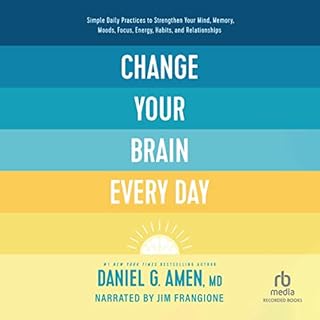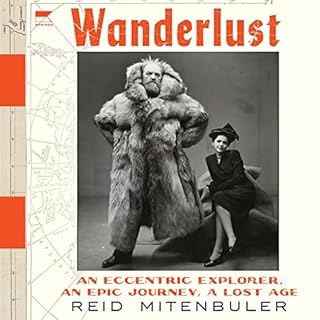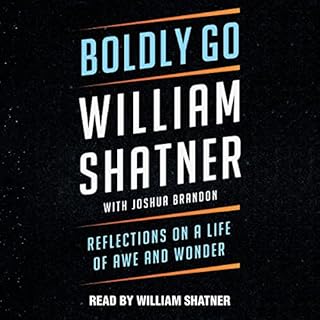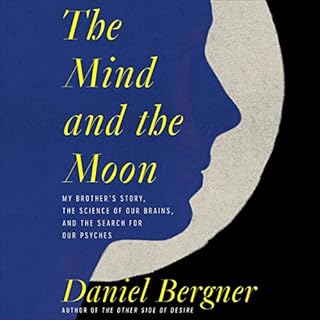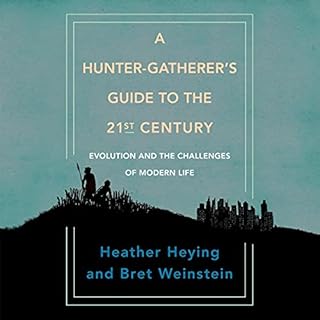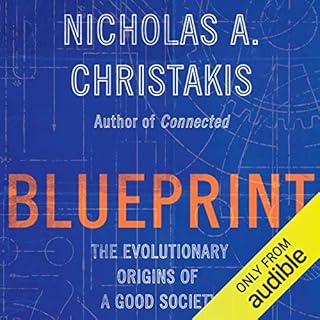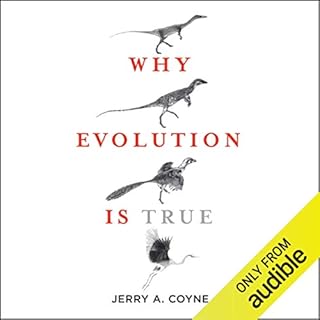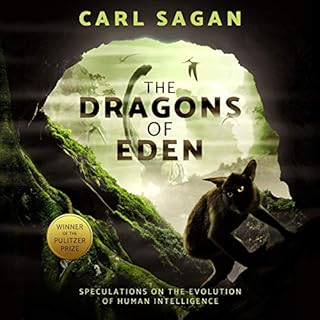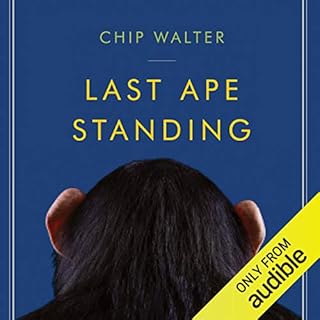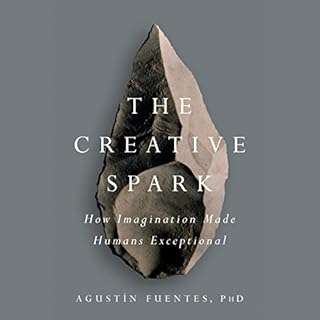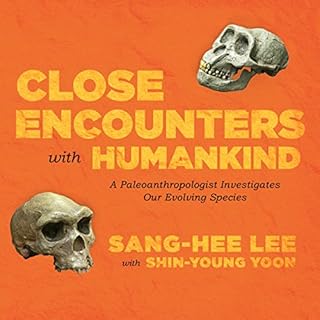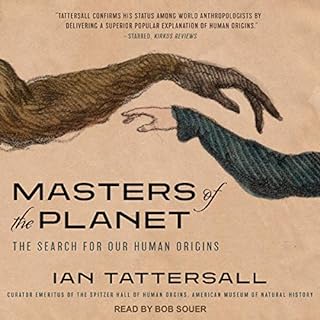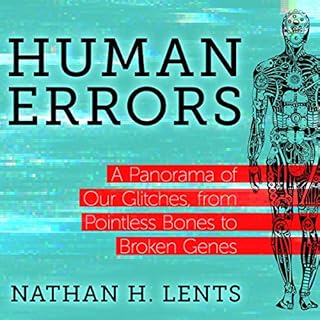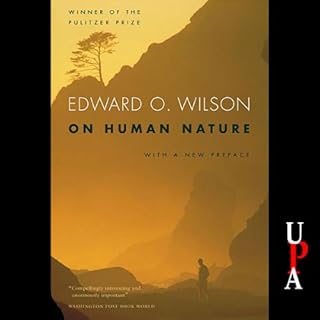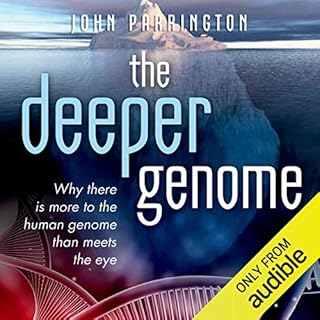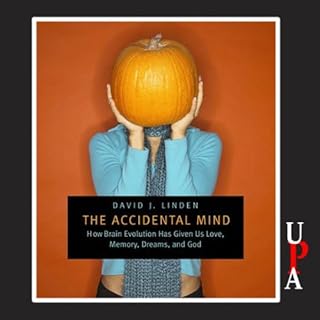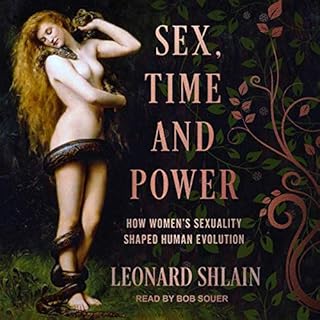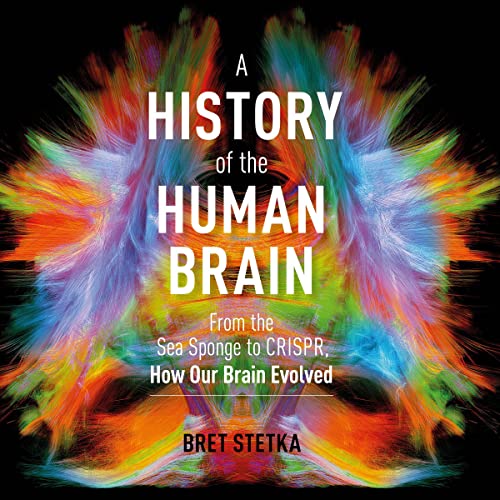
A History of the Human Brain
From the Sea Sponge to CRISPR, How Our Brain Evolved
Failed to add items
Add to Cart failed.
Add to Wish List failed.
Remove from wishlist failed.
Adding to library failed
Follow podcast failed
Unfollow podcast failed
 Prime members: New to Audible?
Prime members: New to Audible?Get 2 free audiobooks during trial.
Buy for $19.49
No default payment method selected.
We are sorry. We are not allowed to sell this product with the selected payment method
-
Narrated by:
-
Sean Pratt
-
By:
-
Bret Stetka
About this listen
Just over 125,000 years ago, humanity was going extinct until a dramatic shift occurred—Homo sapiens started tracking the tides in order to eat the nearby oysters. Before long, they’d pulled themselves back from the brink of extinction. What saved us during that period of endangerment? The human brain, and its evolutionary journey, is unlike anything else in history.
In A History of the Human Brain, Bret Stetka takes listeners through that far-reaching journey, showing exactly when and how the human brain evolved to shape who we are today. A History of the Human Brain also tackles the question of where the brain will take us next, exploring the burgeoning concepts of epigenetics and new technologies like CRISPR.
©2021 Bret Stetka (P)2022 Timber PressListeners also enjoyed...
-
The Possibility of Life
- Science, Imagination, and Our Quest for Kinship in the Cosmos
- By: Jaime Green
- Narrated by: Jaime Green
- Length: 8 hrs and 25 mins
- Unabridged
-
Overall4 out of 5 stars 86
-
Performance4.5 out of 5 stars 76
-
Story4 out of 5 stars 75
One of the most powerful questions humans ask about the cosmos is: Are we alone? While the science behind this inquiry is fascinating, it doesn’t exist in a vacuum. It is a reflection of our values, our fears, and most importantly, our enduring sense of hope. In The Possibility of Life, acclaimed science journalist Jaime Green traces the history of our understanding, from the days of Galileo and Copernicus to our contemporary quest for exoplanets. Along the way, she interweaves insights from science fiction writers who construct worlds that in turn inspire scientists.
-
5 out of 5 stars
-
A dazzling journey into the vast depths of life’s meaning!
- By E. McDermott on 08-11-23
By: Jaime Green
-
Edison's Ghosts
- The Untold Weirdness of History's Greatest Geniuses
- By: Katie Spalding
- Narrated by: Susie Riddell
- Length: 10 hrs and 53 mins
- Unabridged
-
Overall4 out of 5 stars 209
-
Performance4.5 out of 5 stars 157
-
Story4.5 out of 5 stars 157
“As Albert Einstein almost certainly never said, everyone is a genius—but if you judge a fish by its ability to climb a tree, it will live its whole life believing that it is stupid.” So begins Katie Spalding’s spunky takedown of the Western canon, and how genius may not be as irrefutably great as we commonly understand. While most of us may never become Einstein, it may surprise you to learn that there’s probably a bunch of stuff you can do that Einstein couldn’t. And, as Spalding shows, the famous prodigies she explores here were quite odd by any definition.
-
5 out of 5 stars
-
Wonderful Wonderful Read.
- By marc edge on 06-01-23
By: Katie Spalding
-
What's Gotten into You
- The Story of Your Body's Atoms, from the Big Bang Through Last Night's Dinner
- By: Dan Levitt
- Narrated by: Mike Chamberlain
- Length: 12 hrs and 38 mins
- Unabridged
-
Overall4.5 out of 5 stars 125
-
Performance5 out of 5 stars 104
-
Story5 out of 5 stars 104
Every one of us contains a billion times more atoms than all the grains of sand in the earth’s deserts. If you weigh 150 pounds, you’ve got enough carbon to make 25 pounds of charcoal, enough salt to fill a saltshaker, enough chlorine to disinfect several backyard swimming pools, and enough iron to forge a 3-inch nail. But how did these elements combine to make us human?
-
5 out of 5 stars
-
One of the Very Best Science Books I have Read
- By TStair on 03-20-23
By: Dan Levitt
-
Change Your Brain Every Day
- Simple Daily Practices to Strengthen Your Mind, Memory, Moods, Focus, Energy, Habits, and Relationships
- By: Daniel Amen
- Narrated by: Jim Frangione
- Length: 15 hrs and 8 mins
- Unabridged
-
Overall4.5 out of 5 stars 66
-
Performance5 out of 5 stars 56
-
Story4.5 out of 5 stars 56
In Change Your Brain Every Day psychiatrist and clinical neuroscientist Daniel Amen, MD, draws on over 40 years' clinical practice with tens of thousands of patients to give you the most effective daily habits he has seen that can help you improve your brain, master your mind, boost your memory, and make you feel happier, healthier, and more connected to those you love.
-
2 out of 5 stars
-
Repetitive
- By Gary on 04-13-23
By: Daniel Amen
-
Henry at Work
- Thoreau on Making a Living
- By: John Kaag, Jonathan van Belle
- Narrated by: Jonathan Todd Ross
- Length: 6 hrs and 26 mins
- Unabridged
-
Overall4 out of 5 stars 50
-
Performance4.5 out of 5 stars 40
-
Story4.5 out of 5 stars 40
Henry at Work invites listeners to rethink how we work today by exploring an aspect of Henry David Thoreau that has often been overlooked: Thoreau the worker. John Kaag and Jonathan van Belle overturn the popular misconception of Thoreau as a navel-gazing recluse who was scornful of work and other mundanities. In fact, Thoreau worked hard—surveying land, running his family's pencil-making business, writing, lecturing, and building his cabin at Walden Pond—and thought intensely about work in its many dimensions.
-
4 out of 5 stars
-
Interesting Observations of Work Based on Thoreau
- By Nice guy on 07-21-23
By: John Kaag, and others
-
Wanderlust
- An Eccentric Explorer, an Epic Journey, a Lost Age
- By: Reid Mitenbuler
- Narrated by: Peter Noble
- Length: 19 hrs and 13 mins
- Unabridged
-
Overall4.5 out of 5 stars 215
-
Performance5 out of 5 stars 186
-
Story5 out of 5 stars 186
Deep in the Arctic wilderness, Peter Freuchen awoke to find himself buried alive under the snow. During a sudden blizzard the night before, he had taken shelter underneath his dogsled and become trapped there while he slept. Now, as feeling drained from his body, he managed to claw a hole through the ice only to find himself in even greater danger: his beard, wet with condensation from his struggling breath, had frozen to his sled runners and lashed his head in place, exposing it to icy winds that needed only a few minutes to kill him. If Freuchen could escape that, he could escape anything.
-
5 out of 5 stars
-
Amazingly in-depth look at an amazing person.
- By Dave on 06-18-23
By: Reid Mitenbuler
-
The Possibility of Life
- Science, Imagination, and Our Quest for Kinship in the Cosmos
- By: Jaime Green
- Narrated by: Jaime Green
- Length: 8 hrs and 25 mins
- Unabridged
-
Overall4 out of 5 stars 86
-
Performance4.5 out of 5 stars 76
-
Story4 out of 5 stars 75
One of the most powerful questions humans ask about the cosmos is: Are we alone? While the science behind this inquiry is fascinating, it doesn’t exist in a vacuum. It is a reflection of our values, our fears, and most importantly, our enduring sense of hope. In The Possibility of Life, acclaimed science journalist Jaime Green traces the history of our understanding, from the days of Galileo and Copernicus to our contemporary quest for exoplanets. Along the way, she interweaves insights from science fiction writers who construct worlds that in turn inspire scientists.
-
5 out of 5 stars
-
A dazzling journey into the vast depths of life’s meaning!
- By E. McDermott on 08-11-23
By: Jaime Green
-
Edison's Ghosts
- The Untold Weirdness of History's Greatest Geniuses
- By: Katie Spalding
- Narrated by: Susie Riddell
- Length: 10 hrs and 53 mins
- Unabridged
-
Overall4 out of 5 stars 209
-
Performance4.5 out of 5 stars 157
-
Story4.5 out of 5 stars 157
“As Albert Einstein almost certainly never said, everyone is a genius—but if you judge a fish by its ability to climb a tree, it will live its whole life believing that it is stupid.” So begins Katie Spalding’s spunky takedown of the Western canon, and how genius may not be as irrefutably great as we commonly understand. While most of us may never become Einstein, it may surprise you to learn that there’s probably a bunch of stuff you can do that Einstein couldn’t. And, as Spalding shows, the famous prodigies she explores here were quite odd by any definition.
-
5 out of 5 stars
-
Wonderful Wonderful Read.
- By marc edge on 06-01-23
By: Katie Spalding
-
What's Gotten into You
- The Story of Your Body's Atoms, from the Big Bang Through Last Night's Dinner
- By: Dan Levitt
- Narrated by: Mike Chamberlain
- Length: 12 hrs and 38 mins
- Unabridged
-
Overall4.5 out of 5 stars 125
-
Performance5 out of 5 stars 104
-
Story5 out of 5 stars 104
Every one of us contains a billion times more atoms than all the grains of sand in the earth’s deserts. If you weigh 150 pounds, you’ve got enough carbon to make 25 pounds of charcoal, enough salt to fill a saltshaker, enough chlorine to disinfect several backyard swimming pools, and enough iron to forge a 3-inch nail. But how did these elements combine to make us human?
-
5 out of 5 stars
-
One of the Very Best Science Books I have Read
- By TStair on 03-20-23
By: Dan Levitt
-
Change Your Brain Every Day
- Simple Daily Practices to Strengthen Your Mind, Memory, Moods, Focus, Energy, Habits, and Relationships
- By: Daniel Amen
- Narrated by: Jim Frangione
- Length: 15 hrs and 8 mins
- Unabridged
-
Overall4.5 out of 5 stars 66
-
Performance5 out of 5 stars 56
-
Story4.5 out of 5 stars 56
In Change Your Brain Every Day psychiatrist and clinical neuroscientist Daniel Amen, MD, draws on over 40 years' clinical practice with tens of thousands of patients to give you the most effective daily habits he has seen that can help you improve your brain, master your mind, boost your memory, and make you feel happier, healthier, and more connected to those you love.
-
2 out of 5 stars
-
Repetitive
- By Gary on 04-13-23
By: Daniel Amen
-
Henry at Work
- Thoreau on Making a Living
- By: John Kaag, Jonathan van Belle
- Narrated by: Jonathan Todd Ross
- Length: 6 hrs and 26 mins
- Unabridged
-
Overall4 out of 5 stars 50
-
Performance4.5 out of 5 stars 40
-
Story4.5 out of 5 stars 40
Henry at Work invites listeners to rethink how we work today by exploring an aspect of Henry David Thoreau that has often been overlooked: Thoreau the worker. John Kaag and Jonathan van Belle overturn the popular misconception of Thoreau as a navel-gazing recluse who was scornful of work and other mundanities. In fact, Thoreau worked hard—surveying land, running his family's pencil-making business, writing, lecturing, and building his cabin at Walden Pond—and thought intensely about work in its many dimensions.
-
4 out of 5 stars
-
Interesting Observations of Work Based on Thoreau
- By Nice guy on 07-21-23
By: John Kaag, and others
-
Wanderlust
- An Eccentric Explorer, an Epic Journey, a Lost Age
- By: Reid Mitenbuler
- Narrated by: Peter Noble
- Length: 19 hrs and 13 mins
- Unabridged
-
Overall4.5 out of 5 stars 215
-
Performance5 out of 5 stars 186
-
Story5 out of 5 stars 186
Deep in the Arctic wilderness, Peter Freuchen awoke to find himself buried alive under the snow. During a sudden blizzard the night before, he had taken shelter underneath his dogsled and become trapped there while he slept. Now, as feeling drained from his body, he managed to claw a hole through the ice only to find himself in even greater danger: his beard, wet with condensation from his struggling breath, had frozen to his sled runners and lashed his head in place, exposing it to icy winds that needed only a few minutes to kill him. If Freuchen could escape that, he could escape anything.
-
5 out of 5 stars
-
Amazingly in-depth look at an amazing person.
- By Dave on 06-18-23
By: Reid Mitenbuler
-
Boldly Go
- Reflections on a Life of Awe and Wonder
- By: William Shatner, Joshua Brandon
- Narrated by: William Shatner
- Length: 6 hrs and 10 mins
- Unabridged
-
Overall4.5 out of 5 stars 345
-
Performance5 out of 5 stars 287
-
Story4.5 out of 5 stars 287
The beloved star of Star Trek, recent space traveler, and living legend William Shatner reflects on the interconnectivity of all things, our fragile bond with nature, and the joy that comes from exploration with “the insights he’s gleaned over his long, productive life” (Booklist) in this inspiring, revelatory, and exhilarating collection of essays.
-
5 out of 5 stars
-
A very personal reflection of William Shatner at this moment in time.
- By Barbara W. on 10-08-22
By: William Shatner, and others
-
The Mind and the Moon
- My Brother’s Story, the Science of Our Brains, and the Search for Our Psyches
- By: Daniel Bergner
- Narrated by: Daniel Bergner
- Length: 12 hrs and 18 mins
- Unabridged
-
Overall4.5 out of 5 stars 64
-
Performance4.5 out of 5 stars 56
-
Story4.5 out of 5 stars 56
In the early 1960s, JFK declared that science would take us to the moon. He also declared that science would make the “remote reaches of the mind accessible” and cure psychiatric illness with breakthrough medications. We were walking on the moon within the decade. But today, psychiatric cures continue to elude us—as does the mind itself. Why is it that we still don’t understand how the mind works? What is the difference between the mind and the brain? And given all that we still don’t know, how can we make insightful, transformative choices about our psychiatric conditions?
-
4 out of 5 stars
-
Narration
- By M. Morgan on 09-06-22
By: Daniel Bergner
-
Your Future Self
- How to Make Tomorrow Better Today
- By: Hal Hershfield
- Narrated by: Sean Pratt
- Length: 7 hrs and 4 mins
- Unabridged
-
Overall4 out of 5 stars 81
-
Performance4.5 out of 5 stars 68
-
Story4 out of 5 stars 68
We've all had the desire to travel through time and see what our lives will be like later in life. While we want the best possible future for ourselves, we often fail to make decisions that would truly make that a reality. Why are so many of us so disconnected from our future selves? Based on over a decade of groundbreaking research, Your Future Self explains that, in our minds, our future selves often look like strangers.
-
5 out of 5 stars
-
I read the book while also listening to the audible
- By DontWorryBoutMyName on 06-19-23
By: Hal Hershfield
-
A Hunter-Gatherer's Guide to the 21st Century
- Evolution and the Challenges of Modern Life
- By: Heather Heying, Bret Weinstein
- Narrated by: Heather Heying, Bret Weinstein
- Length: 8 hrs and 17 mins
- Unabridged
-
Overall4.5 out of 5 stars 3,771
-
Performance4.5 out of 5 stars 3,286
-
Story4.5 out of 5 stars 3,264
We are living through the most prosperous age in all of human history, yet we are listless, divided, and miserable. Wealth and comfort are unparalleled, but our political landscape is unmoored, and rates of suicide, loneliness, and chronic illness continue to skyrocket. How do we explain the gap between these truths? And how should we respond? For evolutionary biologists Heather Heying and Bret Weinstein, the cause of our troubles is clear: The accelerating rate of change in the modern world has outstripped the capacity of our brains and bodies to adapt.
-
4 out of 5 stars
-
Presents conjecture and bias as science
- By Reviewer on 09-16-21
By: Heather Heying, and others
-
Blueprint
- The Evolutionary Origins of a Good Society
- By: Nicholas A. Christakis
- Narrated by: Nicholas A. Christakis
- Length: 14 hrs and 55 mins
- Unabridged
-
Overall4.5 out of 5 stars 908
-
Performance4.5 out of 5 stars 776
-
Story4.5 out of 5 stars 768
For too long, scientists have focused on the dark side of our biological heritage: our capacity for aggression, cruelty, prejudice, and self-interest. But natural selection has given us a suite of beneficial social features, including our capacity for love, friendship, cooperation, and learning. Beneath all our inventions - our tools, farms, machines, cities, nations - we carry with us innate proclivities to make a good society.
-
5 out of 5 stars
-
Many interesting thoughts
- By Jonas Blomberg Ghini on 06-01-19
-
I, Mammal
- By: Liam Drew
- Narrated by: Neil Gardner
- Length: 11 hrs and 26 mins
- Unabridged
-
Overall5 out of 5 stars 22
-
Performance5 out of 5 stars 20
-
Story5 out of 5 stars 20
A list of the attributes that define a mammal is a ragbag of things - fur, live birth, three bones in the middle ear, a brain whose two halves are robustly joined together.... But this curious collection of features contain the roots of all the biology that makes us what we are: monkeys with massive brains who parent extensively, enjoy sport and think lots. Which is to say, what makes us mammals makes us human.
-
4 out of 5 stars
-
Who knew?
- By Fitmen on 04-25-18
By: Liam Drew
-
Why Evolution Is True
- By: Jerry A. Coyne
- Narrated by: Victor Bevine
- Length: 9 hrs and 55 mins
- Unabridged
-
Overall4.5 out of 5 stars 1,924
-
Performance4.5 out of 5 stars 1,440
-
Story4.5 out of 5 stars 1,436
Why evolution is more than just a theory: it is a fact. In all the current highly publicized debates about creationism and its descendant "intelligent design", there is an element of the controversy that is rarely mentioned: the evidence, the empirical truth of evolution by natural selection.
-
5 out of 5 stars
-
As great as everyone says it is
- By Joseph on 12-01-10
By: Jerry A. Coyne
-
The Dragons of Eden
- Speculations on the Evolution of Human Intelligence
- By: Carl Sagan
- Narrated by: JD Jackson, Ann Druyan
- Length: 6 hrs and 41 mins
- Unabridged
-
Overall4.5 out of 5 stars 742
-
Performance4.5 out of 5 stars 650
-
Story4.5 out of 5 stars 647
Dr. Carl Sagan takes us on a great adventure, offering his vivid and startling insight into the brain of man and beast, the origin of human intelligence, the function of our most haunting legends - and their amazing links to recent discoveries.
-
5 out of 5 stars
-
Surprisingly strengthened by historical context
- By RoguePisigit on 12-07-19
By: Carl Sagan
-
Transcendence
- How Humans Evolved Through Fire, Language, Beauty, and Time
- By: Gaia Vince
- Narrated by: Gaia Vince
- Length: 11 hrs and 27 mins
- Unabridged
-
Overall4.5 out of 5 stars 41
-
Performance4.5 out of 5 stars 37
-
Story4.5 out of 5 stars 37
How four tools enabled humanity to control its destiny What enabled us to go from simple stone tools to smartphones? How did bands of hunter-gatherers evolve into multinational empires? Listeners of Sapiens will say a cognitive revolution - a dramatic evolutionary change that altered our brains, turning primitive humans into modern ones - caused a cultural explosion. In Transcendence, Gaia Vince argues instead that modern humans are the product of a nuanced coevolution of our genes, environment, and culture that goes back into deep time.
-
1 out of 5 stars
-
Far too much bias and unsupported conclusions
- By Kurt Leyendecker on 10-01-20
By: Gaia Vince
-
Last Ape Standing
- The Seven Million-Year Story of How and Why We Survived
- By: Chip Walter
- Narrated by: Bernard Clark, Teresa DeBerry
- Length: 9 hrs and 52 mins
- Unabridged
-
Overall4.5 out of 5 stars 104
-
Performance4 out of 5 stars 93
-
Story4.5 out of 5 stars 90
Why did the line of ancient humans who eventually evolved into us survive when the others were shown the evolutionary door? Chip Walter draws on new scientific discoveries to tell the fascinating tale of how our survival was linked to our ancestors being born more prematurely than others, having uniquely long and rich childhoods, evolving a new kind of mind that made us resourceful and emotionally complex; how our highly social nature increased our odds of survival; and why we became self aware in ways that no other animal seems to be.
-
3 out of 5 stars
-
Harmed by the Narration
- By Cpl Punishment on 03-03-17
By: Chip Walter
-
The Creative Spark
- How Imagination Made Humans Exceptional
- By: Agustín Fuentes
- Narrated by: Agustín Fuentes
- Length: 10 hrs and 27 mins
- Unabridged
-
Overall4.5 out of 5 stars 150
-
Performance4.5 out of 5 stars 127
-
Story4.5 out of 5 stars 125
In the tradition of Jared Diamond's million-copy-selling classic Guns, Germs, and Steel, a bold new synthesis of paleontology, archaeology, genetics, and anthropology that overturns misconceptions about race, war and peace, and human nature itself, answering an age-old question: What made humans so exceptional among all the species on Earth? Creativity. It is the secret of what makes humans special, hiding in plain sight.
-
4 out of 5 stars
-
What's new?
- By Mark on 05-02-17
By: Agustín Fuentes
-
Close Encounters with Humankind
- A Paleoanthropologist Investigates Our Evolving Species
- By: Sang-Hee Lee, Shin-Young Yoon
- Narrated by: Emily Woo Zeller
- Length: 6 hrs and 37 mins
- Unabridged
-
Overall4.5 out of 5 stars 54
-
Performance4.5 out of 5 stars 46
-
Story4.5 out of 5 stars 45
What can fossilized teeth tell us about our ancient life expectancy? What can big data on fossils reveal about farming's problematic role in human evolution? How can simple geometric comparisons of skull and pelvic fossils suggest an origin to our social nature? In Close Encounters with Humankind, paleoanthropologist Sang-Hee Lee explores some of our biggest evolutionary questions from unexpected new angles. Through a series of entertaining, bite-sized chapters, we gain new perspectives into our first hominin ancestors, our first steps on two feet, and more.
-
3 out of 5 stars
-
A different perspective of human ancestry
- By John on 09-15-18
By: Sang-Hee Lee, and others
Critic reviews
“A History of the Human Brain is a unique, enlightening, and provocative account of the most significant question we can ask about ourselves.”—Richard Wrangham, author of The Goodness Paradox
“One of the most lucid, clear-eyed, and talented science writers of our time—Bret Stetka—now turns his attention to the evolution of the human brain, taking us on a captivating journey from its origins to the present, enhancing our understanding of how this phenomenal organ and its 100 billion neurons work.”—Eric Topol, MD, author of Deep Medicine
“There are lots of ideas out there about consciousness and the human brain—the untidy product of millions of years of evolution. Bret Stetka comes as close as you could hope to making sense of them in this entertaining and wide-ranging book.”—Ian Tattersall, curator emeritus, Division of Anthropology, American Museum of Natural History
Related to this topic
-
Transcendence
- How Humans Evolved Through Fire, Language, Beauty, and Time
- By: Gaia Vince
- Narrated by: Gaia Vince
- Length: 11 hrs and 27 mins
- Unabridged
-
Overall4.5 out of 5 stars 41
-
Performance4.5 out of 5 stars 37
-
Story4.5 out of 5 stars 37
How four tools enabled humanity to control its destiny What enabled us to go from simple stone tools to smartphones? How did bands of hunter-gatherers evolve into multinational empires? Listeners of Sapiens will say a cognitive revolution - a dramatic evolutionary change that altered our brains, turning primitive humans into modern ones - caused a cultural explosion. In Transcendence, Gaia Vince argues instead that modern humans are the product of a nuanced coevolution of our genes, environment, and culture that goes back into deep time.
-
1 out of 5 stars
-
Far too much bias and unsupported conclusions
- By Kurt Leyendecker on 10-01-20
By: Gaia Vince
-
The Creative Spark
- How Imagination Made Humans Exceptional
- By: Agustín Fuentes
- Narrated by: Agustín Fuentes
- Length: 10 hrs and 27 mins
- Unabridged
-
Overall4.5 out of 5 stars 150
-
Performance4.5 out of 5 stars 127
-
Story4.5 out of 5 stars 125
In the tradition of Jared Diamond's million-copy-selling classic Guns, Germs, and Steel, a bold new synthesis of paleontology, archaeology, genetics, and anthropology that overturns misconceptions about race, war and peace, and human nature itself, answering an age-old question: What made humans so exceptional among all the species on Earth? Creativity. It is the secret of what makes humans special, hiding in plain sight.
-
4 out of 5 stars
-
What's new?
- By Mark on 05-02-17
By: Agustín Fuentes
-
A Pocket History of Human Evolution
- How We Became Sapiens
- By: Silvana Condemi, Francois Savatier
- Narrated by: Christa Lewis
- Length: 3 hrs and 30 mins
- Unabridged
-
Overall4.5 out of 5 stars 56
-
Performance4.5 out of 5 stars 47
-
Story4.5 out of 5 stars 46
A Pocket History of Human Evolution brings us up-to-date on the exploits of all our ancient relatives. Paleoanthropologist Silvana Condemi and science journalist François Savatier consider what accelerated our evolution: Was it tools, our "large" brains, language, empathy, or something else entirely? And why are we the sole survivors among many early bipedal humans? Their conclusions reveal the various ways ancient humans live on today - from gossip as modern "grooming" to our gendered division of labor - and what the future might hold for our strange and unique species.
-
5 out of 5 stars
-
Well presented and very informative.
- By Jim Griggs on 11-11-21
By: Silvana Condemi, and others
-
Evolving Ourselves
- How Unnatural Selection and Nonrandom Mutation are Changing Life on Earth
- By: Juan Enriquez, Steve Gullans
- Narrated by: Rob Shapiro
- Length: 10 hrs and 50 mins
- Unabridged
-
Overall4.5 out of 5 stars 204
-
Performance4.5 out of 5 stars 178
-
Story4.5 out of 5 stars 181
Why are conditions like autism, asthma, obesity, and allergies exploding at unprecedented rates? Why are we living longer, getting smarter, having far fewer kids? If Darwin were alive today, how would he explain this new world?
-
5 out of 5 stars
-
fascinating ideas and science
- By Joel on 07-04-15
By: Juan Enriquez, and others
-
I, Mammal
- By: Liam Drew
- Narrated by: Neil Gardner
- Length: 11 hrs and 26 mins
- Unabridged
-
Overall5 out of 5 stars 22
-
Performance5 out of 5 stars 20
-
Story5 out of 5 stars 20
A list of the attributes that define a mammal is a ragbag of things - fur, live birth, three bones in the middle ear, a brain whose two halves are robustly joined together.... But this curious collection of features contain the roots of all the biology that makes us what we are: monkeys with massive brains who parent extensively, enjoy sport and think lots. Which is to say, what makes us mammals makes us human.
-
4 out of 5 stars
-
Who knew?
- By Fitmen on 04-25-18
By: Liam Drew
-
Why Evolution Is True
- By: Jerry A. Coyne
- Narrated by: Victor Bevine
- Length: 9 hrs and 55 mins
- Unabridged
-
Overall4.5 out of 5 stars 1,924
-
Performance4.5 out of 5 stars 1,440
-
Story4.5 out of 5 stars 1,436
Why evolution is more than just a theory: it is a fact. In all the current highly publicized debates about creationism and its descendant "intelligent design", there is an element of the controversy that is rarely mentioned: the evidence, the empirical truth of evolution by natural selection.
-
5 out of 5 stars
-
As great as everyone says it is
- By Joseph on 12-01-10
By: Jerry A. Coyne
-
Transcendence
- How Humans Evolved Through Fire, Language, Beauty, and Time
- By: Gaia Vince
- Narrated by: Gaia Vince
- Length: 11 hrs and 27 mins
- Unabridged
-
Overall4.5 out of 5 stars 41
-
Performance4.5 out of 5 stars 37
-
Story4.5 out of 5 stars 37
How four tools enabled humanity to control its destiny What enabled us to go from simple stone tools to smartphones? How did bands of hunter-gatherers evolve into multinational empires? Listeners of Sapiens will say a cognitive revolution - a dramatic evolutionary change that altered our brains, turning primitive humans into modern ones - caused a cultural explosion. In Transcendence, Gaia Vince argues instead that modern humans are the product of a nuanced coevolution of our genes, environment, and culture that goes back into deep time.
-
1 out of 5 stars
-
Far too much bias and unsupported conclusions
- By Kurt Leyendecker on 10-01-20
By: Gaia Vince
-
The Creative Spark
- How Imagination Made Humans Exceptional
- By: Agustín Fuentes
- Narrated by: Agustín Fuentes
- Length: 10 hrs and 27 mins
- Unabridged
-
Overall4.5 out of 5 stars 150
-
Performance4.5 out of 5 stars 127
-
Story4.5 out of 5 stars 125
In the tradition of Jared Diamond's million-copy-selling classic Guns, Germs, and Steel, a bold new synthesis of paleontology, archaeology, genetics, and anthropology that overturns misconceptions about race, war and peace, and human nature itself, answering an age-old question: What made humans so exceptional among all the species on Earth? Creativity. It is the secret of what makes humans special, hiding in plain sight.
-
4 out of 5 stars
-
What's new?
- By Mark on 05-02-17
By: Agustín Fuentes
-
A Pocket History of Human Evolution
- How We Became Sapiens
- By: Silvana Condemi, Francois Savatier
- Narrated by: Christa Lewis
- Length: 3 hrs and 30 mins
- Unabridged
-
Overall4.5 out of 5 stars 56
-
Performance4.5 out of 5 stars 47
-
Story4.5 out of 5 stars 46
A Pocket History of Human Evolution brings us up-to-date on the exploits of all our ancient relatives. Paleoanthropologist Silvana Condemi and science journalist François Savatier consider what accelerated our evolution: Was it tools, our "large" brains, language, empathy, or something else entirely? And why are we the sole survivors among many early bipedal humans? Their conclusions reveal the various ways ancient humans live on today - from gossip as modern "grooming" to our gendered division of labor - and what the future might hold for our strange and unique species.
-
5 out of 5 stars
-
Well presented and very informative.
- By Jim Griggs on 11-11-21
By: Silvana Condemi, and others
-
Evolving Ourselves
- How Unnatural Selection and Nonrandom Mutation are Changing Life on Earth
- By: Juan Enriquez, Steve Gullans
- Narrated by: Rob Shapiro
- Length: 10 hrs and 50 mins
- Unabridged
-
Overall4.5 out of 5 stars 204
-
Performance4.5 out of 5 stars 178
-
Story4.5 out of 5 stars 181
Why are conditions like autism, asthma, obesity, and allergies exploding at unprecedented rates? Why are we living longer, getting smarter, having far fewer kids? If Darwin were alive today, how would he explain this new world?
-
5 out of 5 stars
-
fascinating ideas and science
- By Joel on 07-04-15
By: Juan Enriquez, and others
-
I, Mammal
- By: Liam Drew
- Narrated by: Neil Gardner
- Length: 11 hrs and 26 mins
- Unabridged
-
Overall5 out of 5 stars 22
-
Performance5 out of 5 stars 20
-
Story5 out of 5 stars 20
A list of the attributes that define a mammal is a ragbag of things - fur, live birth, three bones in the middle ear, a brain whose two halves are robustly joined together.... But this curious collection of features contain the roots of all the biology that makes us what we are: monkeys with massive brains who parent extensively, enjoy sport and think lots. Which is to say, what makes us mammals makes us human.
-
4 out of 5 stars
-
Who knew?
- By Fitmen on 04-25-18
By: Liam Drew
-
Why Evolution Is True
- By: Jerry A. Coyne
- Narrated by: Victor Bevine
- Length: 9 hrs and 55 mins
- Unabridged
-
Overall4.5 out of 5 stars 1,924
-
Performance4.5 out of 5 stars 1,440
-
Story4.5 out of 5 stars 1,436
Why evolution is more than just a theory: it is a fact. In all the current highly publicized debates about creationism and its descendant "intelligent design", there is an element of the controversy that is rarely mentioned: the evidence, the empirical truth of evolution by natural selection.
-
5 out of 5 stars
-
As great as everyone says it is
- By Joseph on 12-01-10
By: Jerry A. Coyne
-
Blueprint
- The Evolutionary Origins of a Good Society
- By: Nicholas A. Christakis
- Narrated by: Nicholas A. Christakis
- Length: 14 hrs and 55 mins
- Unabridged
-
Overall4.5 out of 5 stars 908
-
Performance4.5 out of 5 stars 776
-
Story4.5 out of 5 stars 768
For too long, scientists have focused on the dark side of our biological heritage: our capacity for aggression, cruelty, prejudice, and self-interest. But natural selection has given us a suite of beneficial social features, including our capacity for love, friendship, cooperation, and learning. Beneath all our inventions - our tools, farms, machines, cities, nations - we carry with us innate proclivities to make a good society.
-
5 out of 5 stars
-
Many interesting thoughts
- By Jonas Blomberg Ghini on 06-01-19
-
Seven and a Half Lessons About the Brain
- By: Lisa Feldman Barrett
- Narrated by: Lisa Feldman Barrett
- Length: 3 hrs and 53 mins
- Unabridged
-
Overall4.5 out of 5 stars 751
-
Performance4.5 out of 5 stars 622
-
Story4.5 out of 5 stars 612
Have you ever wondered why you have a brain? Let renowned neuroscientist Lisa Feldman Barrett demystify that big gray blob between your ears. In seven short essays (plus a bite-sized story about how brains evolved), this slim, entertaining, and accessible collection reveals mind-expanding lessons from the front lines of neuroscience research. You'll learn where brains came from, how they're structured (and why it matters), and how yours works in tandem with other brains to create everything you experience.
-
3 out of 5 stars
-
slow reader & little bit of a Wokie
- By darren on 06-01-21
-
Masters of the Planet
- The Search for Our Human Origins
- By: Ian Tattersall
- Narrated by: Bob Souer
- Length: 8 hrs and 43 mins
- Unabridged
-
Overall4.5 out of 5 stars 102
-
Performance4.5 out of 5 stars 87
-
Story4.5 out of 5 stars 87
Fifty thousand years ago - merely a blip in evolutionary time - our Homo sapiens ancestors were competing for existence with several other human species, just as their precursors had done for millions of years. Yet something about our species distinguished it from the pack, and ultimately led to its survival while the rest became extinct. Just what was it that allowed Homo sapiens to become masters of the planet? Ian Tattersall, curator emeritus at the American Museum of Natural History, takes us deep into the fossil record to uncover what made humans so special.
-
5 out of 5 stars
-
Great Book, Some Sloppy Editing
- By DB on 11-23-20
By: Ian Tattersall
-
Human Errors
- A Panorama of Our Glitches, from Pointless Bones to Broken Genes
- By: Nathan H. Lents
- Narrated by: L.J. Ganser
- Length: 7 hrs and 54 mins
- Unabridged
-
Overall4.5 out of 5 stars 2,271
-
Performance4.5 out of 5 stars 1,997
-
Story4.5 out of 5 stars 1,992
We humans like to think of ourselves as highly evolved creatures. But if we are supposedly evolution's greatest creation, why do we have such bad knees? Why do we catch head colds so often - 200 times more often than a dog does? How come our wrists have so many useless bones? And are we really supposed to swallow and breathe through the same narrow tube? Surely there's been some kind of mistake. As professor of biology Nathan H. Lents explains in Human Errors, our evolutionary history is nothing if not a litany of mistakes, each more entertaining and enlightening than the last.
-
4 out of 5 stars
-
From Pointless Bones to Broken Genes to...Aliens?
- By Katy.LED on 12-04-18
By: Nathan H. Lents
-
The Human Advantage
- A New Understanding of How Our Brain Became Remarkable
- By: Suzana Herculano-Houzel
- Narrated by: Dina Pearlman
- Length: 7 hrs and 8 mins
- Unabridged
-
Overall4.5 out of 5 stars 36
-
Performance4.5 out of 5 stars 32
-
Story4.5 out of 5 stars 31
Humans are awesome. Our brains are gigantic, seven times larger than they should be for the size of our bodies. The human brain uses 25 percent of all the energy the body requires each day. And it became enormous in a very short amount of time in evolution, allowing us to leave our cousins, the great apes, behind. So the human brain is special, right? Wrong, according to Suzana Herculano-Houzel. Humans have developed cognitive abilities that outstrip those of all other animals but not because we are evolutionary outliers.
-
5 out of 5 stars
-
Take That Raw Foods!
- By Susie on 07-07-16
-
Superlative
- The Biology of Extremes
- By: Matthew D. LaPlante
- Narrated by: George Newbern
- Length: 9 hrs and 27 mins
- Unabridged
-
Overall4.5 out of 5 stars 93
-
Performance4.5 out of 5 stars 79
-
Story4.5 out of 5 stars 79
The world's largest land mammal could help us end cancer. The fastest bird is showing us how to solve a century-old engineering mystery. The oldest tree is giving us insights into climate change. The loudest whale is offering clues about the impact of solar storms. For a long time, scientists ignored superlative life forms as outliers. Increasingly, though, researchers are coming to see great value in studying plants and animals that exist on the outermost edges of the bell curve.
-
5 out of 5 stars
-
Fascinating survey of amazing biology
- By Nerd's-eye view on 12-06-19
-
The Story of the Human Body
- Evolution, Health, and Disease
- By: Daniel Lieberman
- Narrated by: Sean Runnette
- Length: 14 hrs and 54 mins
- Unabridged
-
Overall4.5 out of 5 stars 1,711
-
Performance4.5 out of 5 stars 1,465
-
Story4.5 out of 5 stars 1,465
In this landmark book of popular science, Daniel E. Lieberman - chair of the department of human evolutionary biology at Harvard University and a leader in the field - gives us a lucid and engaging account of how the human body evolved over millions of years, even as it shows how the increasing disparity between the jumble of adaptations in our Stone Age bodies and advancements in the modern world is occasioning this paradox: greater longevity but increased chronic disease.
-
3 out of 5 stars
-
Could Have Been Good, but...
- By Trebla on 04-08-18
By: Daniel Lieberman
-
On Human Nature: Revised Edition
- By: Edward O. Wilson
- Narrated by: Joe Barrett
- Length: 7 hrs and 56 mins
- Unabridged
-
Overall4.5 out of 5 stars 329
-
Performance4.5 out of 5 stars 256
-
Story4.5 out of 5 stars 254
This revised edition of Human Nature begins a new phase in the most important intellectual controversy of this generation: Is human behavior controlled by the species' biological heritage? Does this heritage limit human destiny?
With characteristic pungency and simplicity of style, the author of Sociobiology challenges old prejudices and current misconceptions about the nature-nurture debate.
-
5 out of 5 stars
-
A Heralding Voice...
- By Douglas on 07-22-14
By: Edward O. Wilson
-
The Deeper Genome
- Why There Is More to the Human Genome than Meets the Eye
- By: John Parrington
- Narrated by: John Lee
- Length: 9 hrs
- Unabridged
-
Overall4 out of 5 stars 106
-
Performance4 out of 5 stars 91
-
Story4 out of 5 stars 92
Over a decade ago, as the Human Genome Project completed its mapping of the entire human genome, hopes ran high that we would rapidly be able to use our knowledge of human genes to tackle many inherited diseases, and understand what makes us unique among animals. But things didn't turn out that way.
-
3 out of 5 stars
-
Great Scientific Writing/ Wrong Narrator
- By Richard on 11-24-15
By: John Parrington
-
The Accidental Mind
- How Brain Evolution Has Given Us Love, Memory, Dreams, and God
- By: David J. Linden
- Narrated by: Ray Porter
- Length: 7 hrs and 56 mins
- Unabridged
-
Overall4 out of 5 stars 321
-
Performance4 out of 5 stars 211
-
Story4 out of 5 stars 210
You've probably seen it before: a human brain dramatically lit from the side, the camera circling it like a helicopter shot of Stonehenge, and a modulated baritone voice exalting the brain's elegant design in reverent tones... to which this book says: Pure nonsense.
-
5 out of 5 stars
-
Best general-public Brain Science book to date
- By Francisco on 02-14-11
By: David J. Linden
-
Domesticated
- Evolution in a Man-Made World
- By: Richard C. Francis
- Narrated by: Eric Jason Martin
- Length: 13 hrs and 6 mins
- Unabridged
-
Overall4.5 out of 5 stars 199
-
Performance4.5 out of 5 stars 184
-
Story4.5 out of 5 stars 179
Without our domesticated plants and animals, human civilization as we know it would not exist. We would still be living at subsistence level as hunter-gatherers if not for domestication. It is no accident that the cradle of civilization - the Middle East - is where sheep, goats, pigs, cattle, and cats commenced their fatefully intimate associations with humans.
-
4 out of 5 stars
-
Well, what did you expect?
- By Mark on 03-25-16
-
Sex, Time, and Power
- How Women's Sexuality Shaped Human Evolution
- By: Leonard Shlain
- Narrated by: Bob Souer
- Length: 14 hrs and 30 mins
- Unabridged
-
Overall4.5 out of 5 stars 55
-
Performance4.5 out of 5 stars 48
-
Story4.5 out of 5 stars 48
Sex, Time, and Power offers a tantalizing answer to an age-old question: Why did big-brained Homo sapiens suddenly emerge some 150,000 years ago? The key, according to Shlain, is female sexuality. Drawing on an awesome breadth of research, he shows how, long ago, the narrowness of the newly bipedal human female's pelvis and the increasing size of infants' heads precipitated a crisis for the species. Natural selection allowed for reconfiguration of hormonal cycles, entraining women with the periodicity of the moon - and imbuing women with the concept of time.
-
3 out of 5 stars
-
Interesting conjecture
- By DJKPP on 10-15-20
By: Leonard Shlain
What listeners say about A History of the Human Brain
Highly rated for:
Reviews - Please select the tabs below to change the source of reviews.
-
Overall5 out of 5 stars
-
Performance5 out of 5 stars
-
Story5 out of 5 stars
- Ladyfish
- 08-23-23
Enjoyable
Very well written, and narrated. Well worth a listen. I’ll be turning my son onto it
Something went wrong. Please try again in a few minutes.
You voted on this review!
You reported this review!
1 person found this helpful
-
Overall4 out of 5 stars
-
Performance5 out of 5 stars
-
Story3 out of 5 stars
- Peter
- 01-23-24
Sterile
This title has little central thesis and nothing new to say. It is largely a survey of more interesting reads.
Something went wrong. Please try again in a few minutes.
You voted on this review!
You reported this review!
-
Overall5 out of 5 stars
-
Performance5 out of 5 stars
-
Story5 out of 5 stars
- Scott
- 09-14-23
Really Interesting
Interesting and thought provoking.
Great narration. A more modern take on classics like Sagan’s Broca’s Brain.
Something went wrong. Please try again in a few minutes.
You voted on this review!
You reported this review!
1 person found this helpful
-
Overall4 out of 5 stars
-
Performance5 out of 5 stars
-
Story5 out of 5 stars
- Anonymous User
- 05-04-22
Excellent book
Well researched ad well delivered. Very interesting. I was gripped by this journey that too on us on the history of the human brain.
Something went wrong. Please try again in a few minutes.
You voted on this review!
You reported this review!
4 people found this helpful
-
Overall5 out of 5 stars
-
Performance5 out of 5 stars
-
Story5 out of 5 stars
- Avery Dague
- 03-20-21
understanding where our brains came from
First, the narrator did a great job reading, making the book even more interesting.
A concise look at how we got our brains through evolution. Takes the latest known theories and discoveries to tell the interesting, fact based, story of how we humans got our brains.
The book tells us how we got here and alludes to where we may continue. Our understanding and manipulation of our DNA may well provide humans the next evolution of brain enhancement and development.
In 100 years we will know so much more!
Something went wrong. Please try again in a few minutes.
You voted on this review!
You reported this review!
13 people found this helpful
-
Overall5 out of 5 stars
-
Performance4 out of 5 stars
-
Story5 out of 5 stars
- Jorge Padron
- 12-23-23
Loved it!
Love the way it was written. Easily accessible to someone who isn’t a scientist. My only complaint is the narrator accenting certain words. If that’s what it’s called.
Something went wrong. Please try again in a few minutes.
You voted on this review!
You reported this review!
-
Overall4 out of 5 stars
-
Performance4 out of 5 stars
-
Story4 out of 5 stars
- Kico M
- 01-29-24
Good one
This is a good book with great insights and curiosities about the brain. The book sometimes go off the trail of the brain and talk about other evolution topics, but at the end can reconnect to the main topic. The scientific info is very well explained and structured.
Something went wrong. Please try again in a few minutes.
You voted on this review!
You reported this review!
-
Overall5 out of 5 stars
-
Performance5 out of 5 stars
-
Story5 out of 5 stars
- Cosmos
- 03-30-21
Fascinating survey of the evolution of the human brain
Dr. Stetka did a wonderful job researching the topics for this fascinating and entertaining book. Based on the numerous quoted comments, it is clear that he went to great lengths to set up interviews and put extensive thought and time into the interviews. The writing and presentation is spectacularly engrossing and amusing. The only critique that I would venture falls into the editorial realm, probably involving the decision of the publisher. In a few instances in the early chapters, the term “genetic code” was used when “genome” was the appropriate term. (The Genetic Code is the language by which nucleic acid sequences are translated into protein; thus it is contained only within the highly conserved genes of tRNA and does not consist of the sequences that are transcribed into mRNA to be translated using that language)
Something went wrong. Please try again in a few minutes.
You voted on this review!
You reported this review!
40 people found this helpful
-
Overall5 out of 5 stars
-
Performance5 out of 5 stars
-
Story5 out of 5 stars
- Eve
- 09-30-23
Brilliant information
This book traces the origina of the human brain from the primordial soup to the future. It is a fascinating history and science read.
Something went wrong. Please try again in a few minutes.
You voted on this review!
You reported this review!
1 person found this helpful
-
Overall4 out of 5 stars
-
Performance4 out of 5 stars
-
Story3 out of 5 stars
- Mark
- 01-19-24
High level view
Good overview of brain evolution. Stetka's jokes fall a bit flat. I doubt if some of the statements will stand the test of time.
Something went wrong. Please try again in a few minutes.
You voted on this review!
You reported this review!






